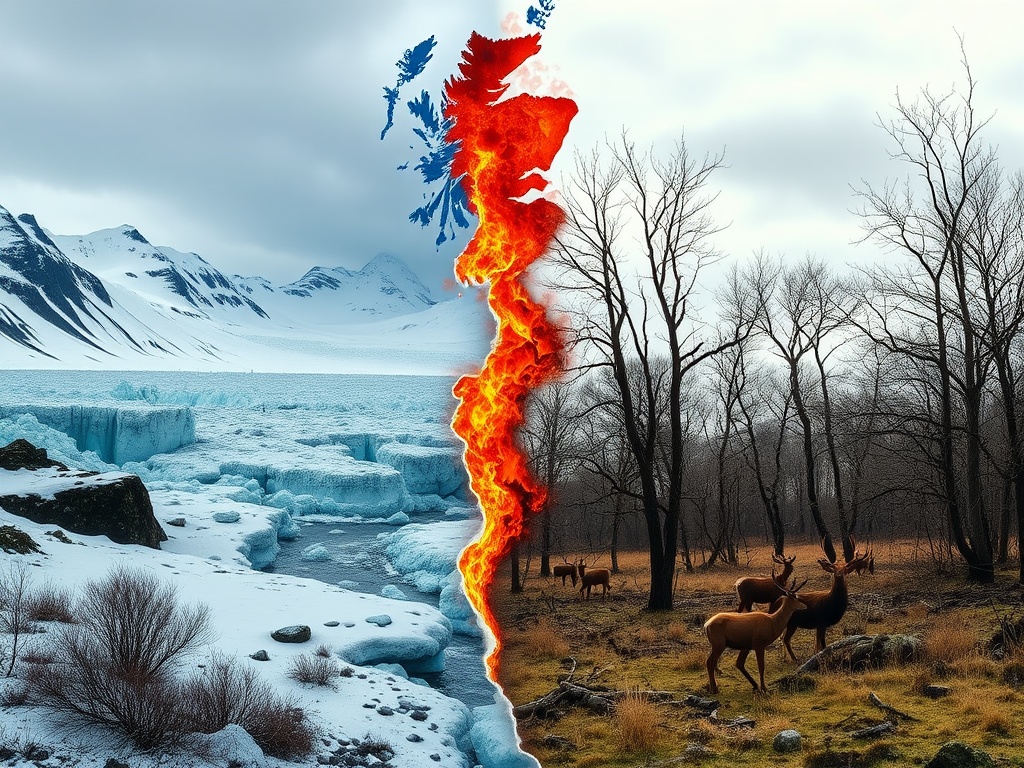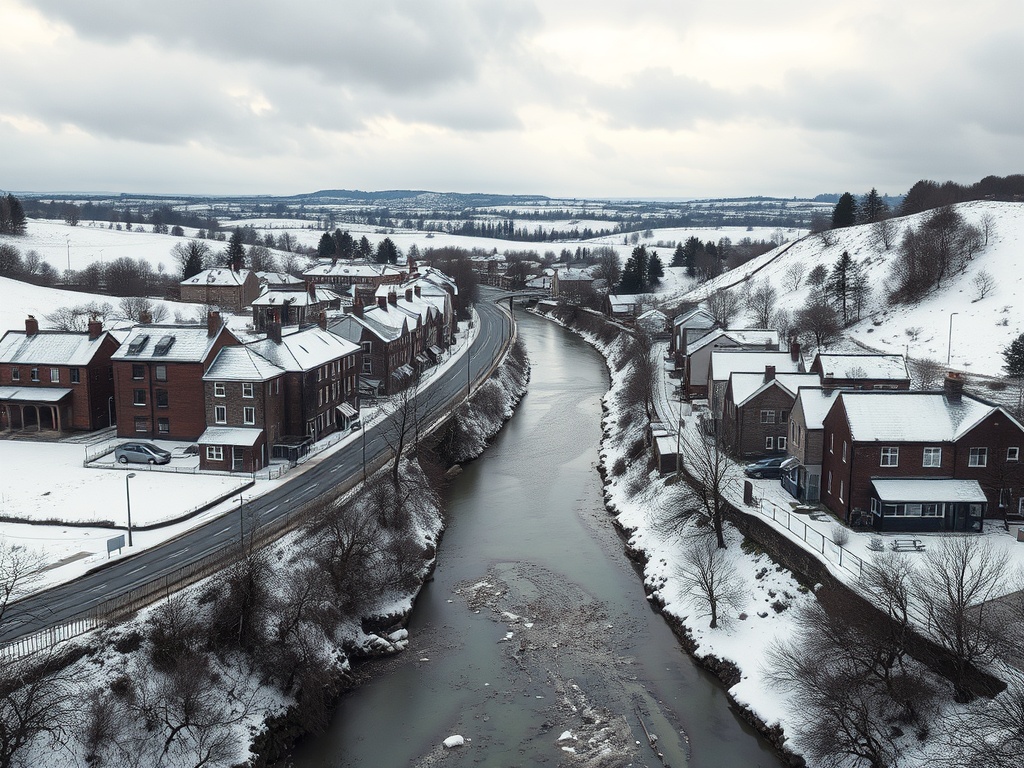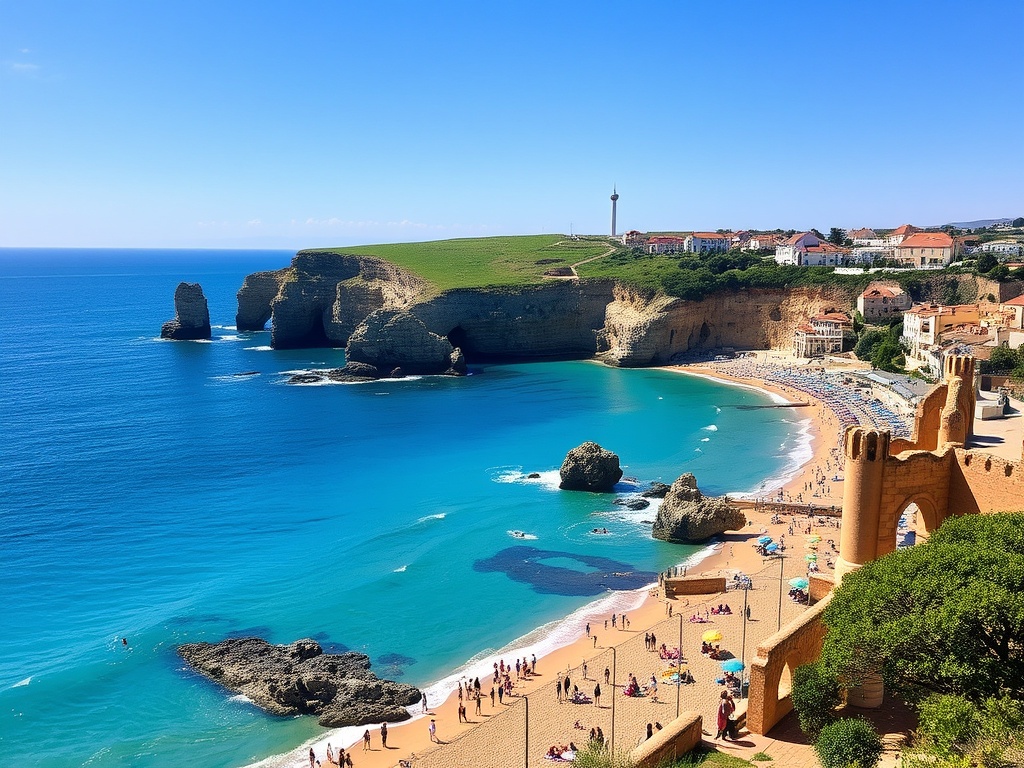A Glimpse into 2080: A Frigid Future for the UK

It is the year 2080, and London is enveloped in a thick blanket of three feet of snow, transforming the once vibrant city into a stark winter landscape. The River Thames lies frozen, a chilling reminder of the climate changes that have become the norm. In other parts of the UK, Scotland has morphed into an icy wilderness, with sea ice visible from its northern coast. The drastic drop in temperatures has rendered only 7 percent of Britain suitable for farming, leading to soaring food prices and widespread riots as rationing measures are enforced.
This is a potential reality that some climate scientists are warning about. While many regions of the globe are projected to become hotter as a consequence of the climate crisis, the UK could be facing a starkly different fate. Off the coast of Greenland and the western shores of Ireland, sea temperatures are plummeting, giving rise to what climate experts are officially calling the “cold blob.”
One might think that such a cold area could provide some respite to a rapidly warming northern hemisphere, potentially creating a refreshing breeze that would maintain the UK’s mild climate. However, this assumption is misguided. According to Bill McGuire, a professor of geophysical and climate hazards at University College London (UCL), the Arctic temperatures may soon become a new reality for the UK. “Currently, global heating is making the UK hotter, not colder, and there is no indication of a downward temperature trend,” he explains.
This warming is largely attributed to the Atlantic Meridional Overturning Circulation (AMOC), a crucial system of currents traversing the Atlantic Ocean. “The AMOC, which includes the Gulf Stream, plays a vital role in shaping the UK’s climate by transporting vast amounts of heat from the tropics to our region,” McGuire elaborates. Without this circulation, the UK’s climate would resemble that of much colder regions, like Labrador in northeastern Canada, which is situated at a similar latitude and known for its reindeer population.
However, the AMOC may be on the brink of a significant downturn. “There is a growing consensus that the AMOC is now failing,” McGuire states. The last time this circulation collapsed was between 115,000 and 112,000 years ago, coinciding with the onset of the last Ice Age. “Various studies indicate a weakening of the AMOC, with one suggesting a 15 percent reduction in strength since the mid-20th century,” he adds. A recent study from 2024 has shown a continuous decline in the AMOC’s strength, with every decade since 1950 witnessing further weakening.
The decline of the AMOC is attributed to the “cold blob,” which has developed due to the rapid melting of Greenland’s ice sheets. “This phenomenon is significant because it is freshening the northern waters of the AMOC, leading to a reduction in their density,” McGuire explains. “This decrease in density prevents AMOC waters from sinking and returning to the tropics, thereby slowing the entire circulation.” Unfortunately, there is little we can do to reverse this trend. “It may be too late to prevent the collapse of the AMOC,” he warns. “Emissions need to be cut by half within five years to have any chance of avoiding a permanent global temperature rise of 1.5°C, which now seems practically impossible. We are unlikely to remain below a 2°C rise.”
McGuire is not alone in his grave assessment. Almost half of the climate scientists surveyed in a recent poll predict that the world will heat up by at least 3°C by 2100. “Such a rise could potentially spell the end of civilization as we know it,” he cautions. According to him, rather than trying to reverse the clock, efforts should be directed towards preparing for the inevitable changes. “Countries must ensure that infrastructure, food security, services, and public engagement are robust enough to withstand what may require a war-like response,” he asserts. A 2020 paper from the University of Exeter estimated that only 7 percent of UK land would remain suitable for arable farming in this new climate, down from the current 32 percent. “This situation may necessitate rationing, restricted civil liberties, and other measures that could be in place for centuries,” he adds.
Concerns regarding AMOC failure have emerged relatively recently. In 2021, the UN’s Intergovernmental Panel on Climate Change assessed that the slowing of the AMOC would only slightly impact Britain’s climate. “We still cannot be certain that the AMOC will collapse—most models suggest it won’t,” notes Chris Brierly, a professor of climate science at UCL. “However, we cannot dismiss the possibility that the process has already begun. It could take years or even decades to unfold.” A 2024 study conducted by researchers at the University of Copenhagen concluded that the AMOC is unlikely to slow down gradually but may instead collapse suddenly. They indicated that this could occur as early as next year, or more likely by the 2050s.
Despite the dire outlook, some climate scientists hesitate to label this scenario as apocalyptic. “Winters would likely become much colder than summers. Given that this would be in addition to climate change, it could potentially offset winter warming,” Brierly suggests. If the UK and Northern Europe were to descend into an Arctic winter, the repercussions would reverberate globally. “The consequences would be immense, likely leading to an economic crash and societal upheaval,” McGuire warns. “The shutdown of the AMOC would cause northward-flowing currents to back up, rapidly elevating sea levels along the eastern coasts of Canada and the US.”
A collapse of the AMOC would also weaken the monsoon systems in Africa and Asia, leading to widespread famine. This scenario unfolds against the backdrop of rising global temperatures elsewhere: “Increased warming in the southern hemisphere could exacerbate drought in the Amazon and accelerate melting in Antarctica, further intensifying sea level rise,” McGuire explains.
It is a grim vision of the future. Yet, McGuire reminds us that this is a crisis of our own making. “This is entirely the result of human-induced global heating,” he states. “Between 1994 and 2017 alone, the melting ice across the planet—particularly from the Greenland ice sheet—added 28 trillion tonnes of water to the oceans. It is essential that monitoring of the AMOC is maintained, if not intensified.”
However, despite the urgency of the situation, McGuire remains skeptical about whether it will be addressed with the necessary seriousness. “European governments need to be proactively planning for a future that could be significantly colder,” he insists. “As far as I know, there are currently no plans in place.”
Bill McGuire’s upcoming book, The Fate of the World: How Our Future is Written in the Past, will be released next year.




